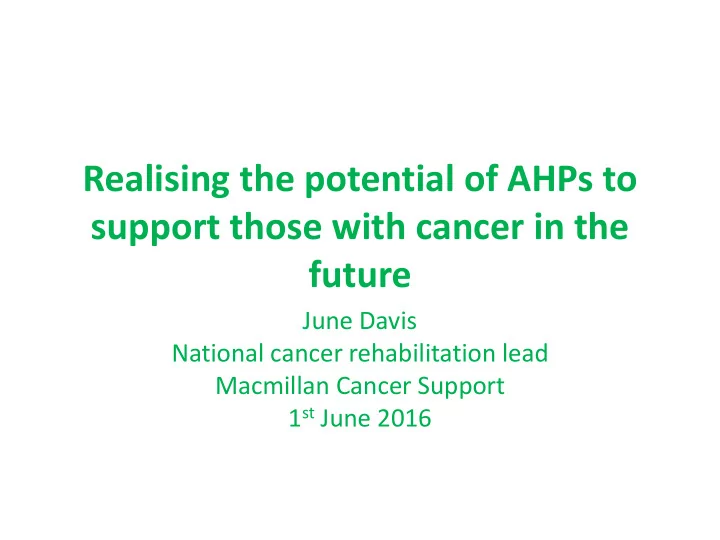

Realising the potential of AHPs to support those with cancer in the future June Davis National cancer rehabilitation lead Macmillan Cancer Support 1 st June 2016
The shifting pattern of survival Total Prevalence - now Total Prevalence - 2030 Recovery and readjustment CRUK. Cancer survival statistics. Maddams J, Utley M, Moller H. Projections of cancer prevalence in the United Kingdom, 2010-2040. Br J Cancer. 2012. 107: 1195-1202. J Maher and H McConnell (2011) New pathways of care for cancer survivors: adding the numbers. Br J Cancer 105, (S5-S10)
Not everyone is living well
Some people with cancer can live with their needs unmet for years Practical and personal 64% needs Housework and cooking - Personal care - 14% Mobility - 32% 31% Emotional 78% needs Macmillan Cancer Support. Hidden at home. 2015. London
Communication Neuropathy Cognitive difficulties / Continence (peripheral & impairment cognitive) disorders Exercise & Fatigue & energy Dysphagia Lymphoedema physical wellbeing management Metastatic spinal Loss of visual Altered body Pain cord compression function image Breathlessness Limb amputation
Data from the Scottish School of Primary Care’s Multimorbidity Research Programme.
Alongside an ageing population, with increased multi-morbidities Hypertension Obesity 42% 31% Mental Health condition People 21% living with cancer in Chronic the UK Heart Disease Chronic 19% Kidney Disease Arthritis Diabetes 17% 16% 14% Co morbidities will increasingly have a significant impact on clinical and social needs of PLWC and person centred approach to care 1. Macmillan Cancer Support. 2014. Cancer in the context of other long-term conditions.
Needs of people living with cancer
Taking the cancer strategy forward May 2016 • 57% patients surviving 10 years or more • Rec: 70: Review of the cancer rehabilitation workforce • By March 2017 drive spread of risk stratified pathways • Review approaches to reducing and managing long term consequences of treatment • By March 2017 develop a vision for the future shape an skill mix of the workforce required • Review communication skills for NHS staff and introduce a tiered competence framework for staff providing end of life care.
Health Education Framework 15 – The future healthcare workforce 1. Include informal support to help people prevent ill health 2. Skills, values and behaviours to provide co-production 3. Adaptable skills responsive to evidence and innovation. 4. Skills, values and behaviours to promote safe, high quality care. 5. Deliver the NHS Constitution – bring the highest levels of skills and knowledge at times of basic human need when care and compassion are what matter most
Commissioning person centred care for people living with and beyond cancer Rehabilitation services - All patients must have access to appropriately skilled allied health professionals (including occupational therapists, physiotherapists, speech and language therapists, dietitians, psychologists and therapeutic radiographers) to support their individual needs throughout the whole cancer pathway, where appropriate.
NHS England commissioning guidance for rehabilitation – The principles of good rehabilitation – March 2016 Principle 6 Have an appropriately educated and trained team, able to utilise a range of interventions and skills that are underpinned by a sound evidence base.
Shortage of specialist professionals
Many of these people could be helped with simple interventions and support for self-management What stops non-cancer specialists? Barriers include: • Health and social care professionals’ knowledge • People affected by cancer not knowing enough about what to look out for, or how to seek help if they experience problems.
AHP education and training in cancer • Only 29% had received any form of cancer education as part of their undergraduate training • 78% had never had communication skills training
Recommendations • Increase confidence and capability in the AHP workforce and transfer of knowledge and skills to working with those with cancer • PT and OT professional groups and other AHP groups need to work with universities locally and nationally to increase the amount of education AHP students receive about cancer • Training and education on how to effectively tailor assessment and treatment to meet those with a cancer diagnosis • Extend communication skills
Macmillan AHP competence framework development Clinical practice Care Supporting coordination independence AHP competence framework Interagency Professional and partnership practice working
Macmillan Role Development Programme • To support specialist cancer practice We have been building a • Blended learning, including mentor development sessions programme to support the • Cancer pathway, Macmillan services, establishment autonomous practice of cancer specialists • UK wide band 5/6 nurses and AHPs • Pilot March 2016; Refined offer Autumn 2016
Extended roles • Improved job satisfaction and staff experience • Improved patient experience and outcomes – Patients with multiple chronic conditions require more holistic care. Extended roles, with a scope of practice across traditional boundaries, can deliver this • More efficient use of staff time and resources – Equipping staff with a broader range of skills and encouraging them to practise at the ‘top of their licence’ – Improved job satisfaction and staff experience
Advanced practice roles • Offer opportunities to improve clinical continuity • Provide mentoring and training for less experienced staff • Offer a rewarding, clinically facing career option for experienced staff • Non medical prescribing • Fill in gaps in the medical workforce. • The roles can be developed relatively rapidly, in around three years. Nuffield Trust (2016) Reshaping the workforce to deliver the care patients need.
Thank you
Recommend
More recommend